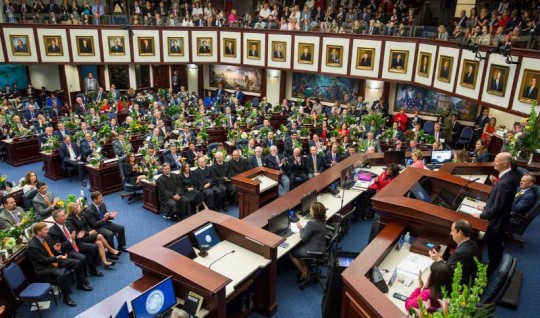New Florida Budget Year Brings Boost In Spending
June 29, 2018
Florida’s new $88.7 billion budget will take effect Sunday, but that doesn’t tell the whole story about spending on education, health care, transportation and other state programs in the new fiscal year.
Projected spending in 2018-2019 is greater than the budget bottom line because lawmakers and Gov. Rick Scott approved 16 bills during the 2018 legislative session that included additional funding totaling nearly $610 million.
The $89.3 billion in spending is $4.36 billion higher than the 2017-2018 budget year that ends Saturday, representing more than a 5 percent increase. It is more than $20 billion higher than the $69 billion 2011-2012 spending plan, which was the first under Scott, who leaves office in January because of term limits.
The state’s largest expenditures in 2018-2019 will be on human services, which include Medicaid and other health-care programs, accounting for 43.3 percent of the spending. Education will be the second largest component at 28.5 percent.
Among the bills was legislation (SB 4) making permanent an expansion of the Bright Futures scholarship program, including covering 75 percent of the tuition and fees in the new academic year for students who are “medallion scholars.” The $123.5 million in spending will also let those students use their scholarships for summer classes in 2019.
An additional $53.6 million will be spent on dealing with Florida’s ongoing opioid crisis through another bill (HB 21).
The largest spending outside the main budget is $400 million for the Marjory Stoneman Douglas High School Public Safety Act (SB 7026), which passed after the Feb. 14 mass shooting that killed 17 people at the Broward County school.
The legislation includes $69 million for mental-health programs in school districts, a $97 million increase to hire more school resource officers, a $98 million grant program for improving school security and $67 million for an initiative that would allow school personnel to be trained as armed “guardians” on school campuses.
The increased safety spending is reflected in a $485 million increase in the funding formula for the 67 school districts in 2018-2019. But since much of the $101.50 increase in per-student funding is earmarked for the safety programs, the school districts will only see a statewide average increase of 47 cents in the “base student allocation,” the primary source for general operations.
State employees will not receive a general pay raise in the new budget, which was approved by lawmakers in March. But there will be targeted increases.
The seven state Supreme Court justices will see their annual pay rise to $220,600, a 24 percent increase.
State law enforcement officers could get a raise up to 10 percent if they have 10 or more years of experience. Department of Juvenile Justice probation and detention officers will get a 10 percent increase.
State firefighters will get a $2,500 annual pay raise, while there will be adjustment up to $4,000 a year for assistant state attorneys and public defenders if they have worked more than three years in their offices.
In health care, the new budget has nearly a $900 million increase to account for additional costs in Medicaid, the state-federal health program for poor and disabled people. There is $128.5 million increase in Medicaid payments to nursing homes.
Nursing home patients will benefit from a $16.9 million increase in their “personal needs allowance,” which will increase by $25 a month to $130. It will allow them to pay for personal services and items like hair styling and clothes.
In the environmental arena, in addition to $101 million for the Florida Forever land-acquisition program, there is $64 million for an Everglades-area reservoir project, $50 million for natural springs restoration, $50 million for repairs to the Herbert Hoover Dike around Lake Okeechobee and $50 million for beach-management grants to local governments.
The new budget has a $9.9 billion “work program” for the Department of Transportation, including $3.9 billion for the construction of highways and bridges and $1.3 billion for resurfacing and maintenance.
More than $454 million is slated to be spent on education construction and maintenance projects in the new academic year. That includes $50 million for maintenance at public schools and $145 million for charter schools.
The budget includes $3.25 billion in reserve funding, including $1 billion in unspent general revenue, $1.48 billion in a budget-stabilization fund and $770 million in the Chiles endowment, which is funded by a settlement with tobacco companies.
by Lloyd Dunkelberger, The News Service of Florida




Comments